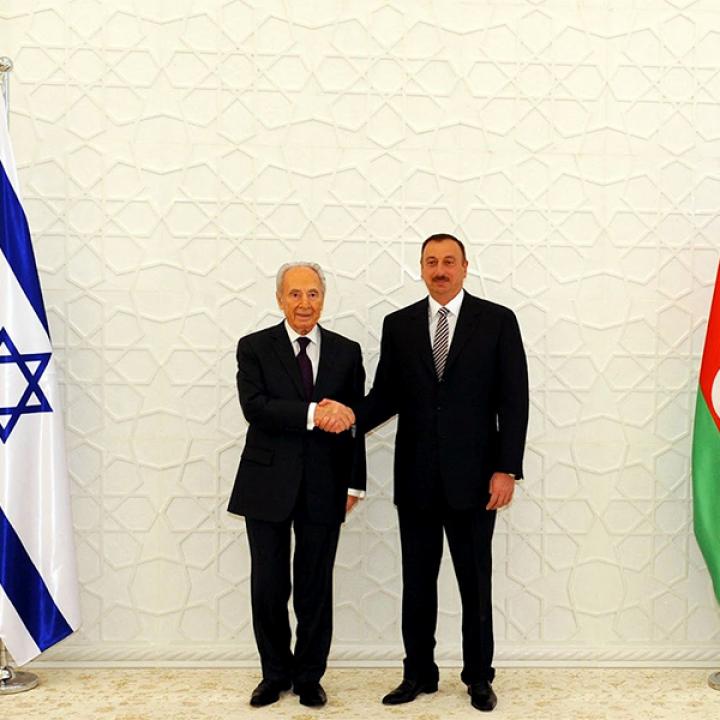

The current conflict in the Caucasus between Azerbaijan and Armenia is an extraordinary case where Israel and Iran, while both claiming neutrality, are actually tilting toward the same side: Azerbaijan. Israel buys Azerbaijan's oil and sells it advanced weapons, now being used to deadly effect; while Iran proclaims its support for Azerbaijan’s “territorial integrity”—code words for its claim to Nagorno-Karabakh and adjoining bits of territory held by Armenian separatists. How does this small though oil- and gas-rich country of 10 million mostly Shia Muslims, right on Iran’s northern border, manage this remarkable geopolitical feat?
A few years ago, in search of the answer, I journeyed to Baku to lecture at a “strategic studies” think tank conference and at the local diplomatic academy, and I have since then kept up with some Azerbaijani colleagues. They are often serious yet affable and stridently nationalist while also cosmopolitan, and many of them are multilingual in totally unrelated tongues: their native Azerbaijani—very close to Turkish—plus Russian, English, Farsi, and sometimes even Arabic. But such personal qualities go only so far in explaining their country’s ability to navigate its much larger neighbor’s regional rivalries.
One thing I discovered on this first visit is that democracy is not the answer to Azerbaijan’s quest for security, stability, or support from competing outside powers. Ever since independence from the ruins of the Soviet Union in 1991, the country has been ruled by men from just one family: first Heydar Aliyev, a communist-era strongman holdover, and now Ilham Aliyev, his equally autocratic son. If there are rumblings of dissent, petrodollars and anti-Armenian sentiment usually suffice to suppress them. One local acquaintance summed up the prevailing cynicism about democracy this way: “Yes, we have a parliament, but some of its members don’t even bother to show up. I don’t understand it—at least, sell your vote!”
Instead, the secret of Azerbaijan’s foreign policy success so far lies in a very delicate, deliberate balancing of interests and threats. Its government and elite, nominally Shia Muslim but almost uniformly secular in practice, generally despise Iran’s oppressive theocracy, but they also fear Iranian agents and Hezbollah proxies on their soil, who have periodically attempted to hit Israeli or American targets there.
Less obviously but no less importantly, Azerbaijani people care about their millions of ethnic kinsmen across the border who constitute Iran’s largest minority by far, around double the number of Azeris in Azerbaijan itself. Conversely, Iran’s regime views with some concern the potential “nationalist” sympathies of its subject ethnic Azeris for their wealthier, healthier, and socially freer kinfolk just across the border in Azerbaijan. As such, both governments take good care to maintain healthy diplomatic and commercial relations in order to protect both themselves and their distant relatives in Tabriz or Tehran. And they make sure that the Israelis do not directly threaten Iran too much from Azerbaijani territory.
A classic case in point, never officially acknowledged by any interested party, occurred around a decade ago. At the height of unresolved tension back then over Iran’s nuclear program, serious rumors began to circulate that Israel was on the verge of bombing it. A report even appeared in the press that some Israeli military aircraft were moving to bases nearby in Azerbaijan. But that report itself ended the plot, if indeed it existed. The leak signaled that Baku, or perhaps Washington, or both, were opposed to any such action and had decided to expose and thereby preempt it.
At the same time, Azerbaijan relies partly on Israel to counter potential internal security or other threats from Iran. Some of this lies in the realm of intelligence, early warning, cybersecurity, high-tech equipment and training, and the like. Some cooperation is more political in nature: Azerbaijani officials and experts believe, probably with good reason, that their close ties with Israel help solidify their good relations with the United States—which of course shares its own strong interest in containing Iran and protecting Azerbaijan against Iranian influence. A recent, highly symbolic step in this diplomatic dance was the very public participation by Azerbaijan’s ambassador to Washington, rare among Muslim-majority delegations, in the White House ceremony celebrating the new peace accords between Israel, the UAE, and Bahrain.
This tight American connection leads straight to the larger geopolitical juggling act that Baku must maintain between the United States and Russia. Decent relations with both are essential, in Azerbaijani eyes, for protection not only against possible Iranian designs, but also against Russia’s own ambitions, whether in neighboring Armenia, in the common energy-wealthy Caspian littoral, or inside Azerbaijan itself. Without actual Russian military backing, my Azerbaijani hosts told me, the vastly outnumbered Armenians could not hold on to Nagorno-Karabakh. Yet Azerbaijan has little choice but to accommodate Russia anyway, precisely in order to avoid even worse security outcomes.
So Baku, in its own interest, continues to balance these opposing regional and global players against each other: Israel and Iran, American and Russia. The key is never to align fully or exclusively with any of them, so that none is provoked to lash out too harshly, and all keep an interest in playing along. In the current conflict, Turkey has also entered the fray on Azerbaijan’s side, though so far its support is more rhetorical than real.
Nevertheless, for now, it seems doubtful that even this truly unusual combination of allies will enable Azerbaijan to recapture all of its disputed territory. And it may always remain in some potential jeopardy from its much more powerful neighbors, or, just possibly, from some outburst of internal opposition. The most likely scenario, however, is that Baku’s skill at keeping unlikely bedfellows together will continue to preserve its own core interests without altering the fundamental tensions at stake. Neither Israel nor Iran is poised to gain a decisive advantage from either one’s ties with Azerbaijan, which is just the way Baku wants it.



